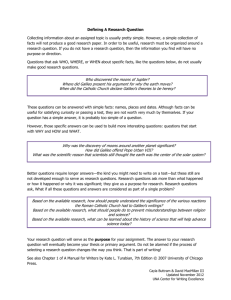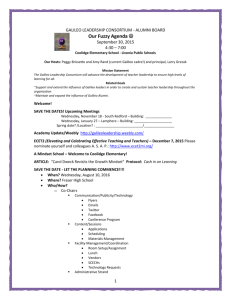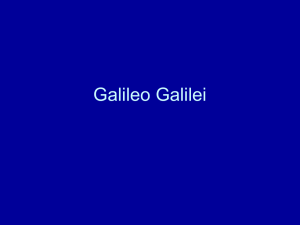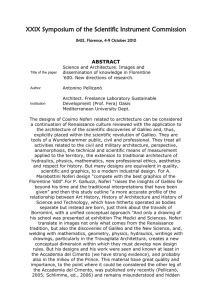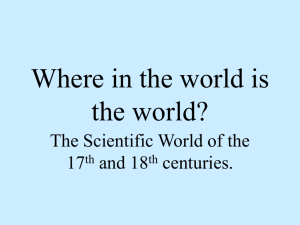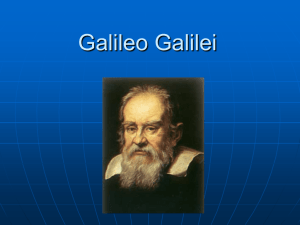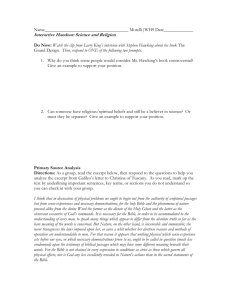Heliocentrism and the Catholic Church Timeline
advertisement
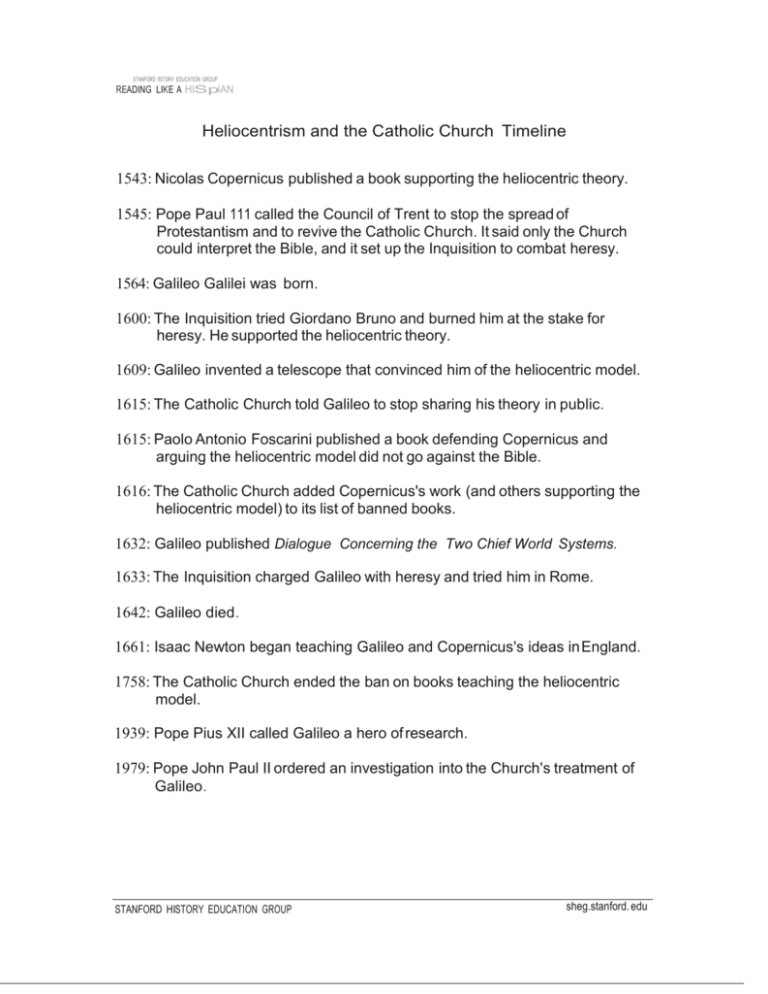
STANFORD flSTORY EDUCATION GROUP READING LIKE A HISplAN Heliocentrism and the Catholic Church Timeline 1543: Nicolas Copernicus published a book supporting the heliocentric theory. 1545: Pope Paul 111 called the Council of Trent to stop the spread of Protestantism and to revive the Catholic Church. It said only the Church could interpret the Bible, and it set up the Inquisition to combat heresy. 1564: Galileo Galilei was born. 1600: The Inquisition tried Giordano Bruno and burned him at the stake for heresy. He supported the heliocentric theory. 1609: Galileo invented a telescope that convinced him of the heliocentric model. 1615: The Catholic Church told Galileo to stop sharing his theory in public. 1615: Paolo Antonio Foscarini published a book defending Copernicus and arguing the heliocentric model did not go against the Bible. 1616: The Catholic Church added Copernicus's work (and others supporting the heliocentric model) to its list of banned books. 1632: Galileo published Dialogue Concerning the Two Chief World Systems. 1633: The Inquisition charged Galileo with heresy and tried him in Rome. 1642: Galileo died. 1661: Isaac Newton began teaching Galileo and Copernicus's ideas in England. 1758: The Catholic Church ended the ban on books teaching the heliocentric model. 1939: Pope Pius XII called Galileo a hero of research. 1979: Pope John Paul II ordered an investigation into the Church's treatment of Galileo. STANFORD HISTORY EDUCATION GROUP sheg.stanford. edu STANFORD HISTORY EDUCATION GROUP READING LIKE A H1si.:R1AN Document A: Galileo's Letter (Modified) Galileo wrote the following letter to Duchess Christina of Tuscany in 1615. In this letter, he defends himself against the charges of heresy. Some years ago I discovered in the heavens many things that had not been seen before our own age. The novelty of these things . . . stirred up several professors against me. They hurled various charges and published numerous writings filled with vain arguments, and they made the grave mistake of sprinkling these with passages taken from places in the Bible, which they failed to understand properly. The reason given for attacking the opinion that the earth moves and the sun stands still is that in many places in the Bible one may read that the sun moves and the earth stands still. Since the Bible cannot err, it follows that anyone who claims that the sun is motionless and the earth movable takes an erroneous and heretical position. With regard to this argument, I think in the first place that it is very pious to say and prudent to affirm that the holy Bible can never speak untruthwhenever its true meaning is understood. But I believe nobody will deny that the Bible is often very complex, and may say things which are quite different from what its bare words signify . . . . I do not believe that the same God who has given senses, reason and intellect has intended us to not to use them . . . . He would not require us to deny sense and reason in physical matters of direct experience . . . . Can an opinion be heretical and yet have no concern with the salvation of souls? Source: Galileo Galilei, "Letter to the Grand Duchess Christina of Tuscany," 1615. Vocabulary novelty: original or unusual vain: conceited err: to be wrong erroneous: wron STANFORD HISTORY EDUCATION GROUP pious: devoutly religious prudent: wise signify: mean sheg.stanford. edu STANFORD HISTORY EDUCATION GROUP READING LIKE A HIS,;:::RIAN Document B: Cardinal Bellarmine Cardinal Robert Bellarmine was in charge of dealing with difficult issues connected to the Church's power and beliefs during the Galileo controversy. He wrote the following letter to Paolo Antonio Foscarini in response to Foscarini's book defending Galileo. Historians don't believe Bellarmine ever saw Galileo's 1615 letter (Document A). As you know, the Council [of Trent] prohibits interpreting the Scriptures contrary to the common agreement of the holy Fathers. And if you would read not only the Fathers but also the commentaries of modern writers on Genesis, Psalms, Ecclesiastes and Joshua, you would find that all agree in explaining that the sun is in the heavens and moves swiftly around the earth, and that the earth is far from the heavens and stands immobile in the center of the universe. . . . It would be just as heretical to deny that Abraham had two sons and Jacob twelve , as it would be to deny the virgin birth of Christ, for both are declared by the Holy Ghost through the mouths of the prophets and apostles . . . . I say that if there were a true demonstration that the sun was in the center of the universe and the earth in the third sphere, and that the sun did not travel around the earth but the earth circled the sun, then it would be necessary to proceed with great caution in explaining the passages of Scripture which seemed contrary, and we would rather have to say that we did not understand the Scripture than to say that something was false which has been demonstrated. But I do not believe that there is any such demonstration; none has been shown to me. . . . [One] clearly experiences that the earth stands still and that his eye is not deceived when it judges that the moon and stars move. Source: Cardinal Robert Bellarmine, "Letter on Galileo's Theories," 1615. Vocabulary contrary: against or the opposite of something Genesis, Psalms, Ecclesiastes and Joshua: sections of the Bible STANFORD HISTORY EDUCATION GROUP prophets: someone who speaks for God apostles: religious messengers scripture: text from the Bible sheg.stanford. edu STANFORD >ISTORY WJCATION GROUP READI NG LIK E A HISf.:::RIAN Guiding Questions Document A: Galileo's Letter 1. (Sourcing) When was this document written? 2. (Contextualization) Look at your timeline. Why might Galileo write a letter defending himself at this time? 3. (Close Reading) According to Galileo, why do some people think his teachings are heretical? 4. (Close Reading) How does Galileo defend himself against these charges? 5. (Context) Using the information on your timeline , do you think the Catholic Church would accept Galileo's defense? Why or why not? STANFORD HISTORY EDUCATION GROUP sheg.stanford. edu STANFORD HISTORY EDUCAllON GROUP READING LIKE A HISplAN Document B: Cardinal Bellarmine 1. (Close Reading) Explain two reasons Cardinal Bellarmine gave for believing the geocentric theory . a. b. 2. (Close Reading) How did Cardinal Bellarmine respond to the following arguments from Galileo? a. The Bible passages about the sun standing still should not have been interpreted literally. b. The model of the universe (heliocentric or geocentric) is not a matter of salvation. 3. (Context) Why do you think the Catholic Church was so committed to defending the literal meaning of the Bible passages? STANFORD HISTORY EDUCATION GROUP sheg.stanford. edu STANFORD HISTORY EDUCATION GROUP READING LIKE A H1Sp1AN Document C: Condemnation of Galileo (Modified) In 1632, Galileo, who had been teaching and writing about the idea that the Earth moved around the sun, was summoned to Rome to stand trial. After questioning the relevant witnesses, thejudges issued the following condemnation of Galileo. You, Galileo of Florence, were denounced in 1615, by this Holy Office, for holding as true a false doctrine taught by many, namely, that the sun is immovable in the center of the world, and that the earth moves . . . also, for explaining the Scriptures according to your own meaning. Therefore . . . by the desire of his Holiness and the Most Eminent Lords, Cardinals of this supreme and universal Inquisition, the two propositions of the stability of the sun, and the motion of the earth, were qualified as follows: 1. The proposition that the sun is in the center of the world and immovable from its place is absurd, philosophically false, and formally heretical; because it is expressly contrary to Holy Scriptures. 2. The proposition that the earth is not the center of the world, nor immovable, but that it moves is also absurd, philosophically false, and, theologically considered, at least erroneous in faith. Therefore, in the most holy name of our Lord Jesus Christ and of His Most Glorious Mother Mary, We pronounce, judge, and declare, that you Galileo . . . have made yourself suspected by this Holy Office of heresy, that is, of having believed and held the doctrine (which is false and contrary to the Holy and Divine Scriptures) that the sun is the center of the world , and that it does not move from east to west, and that the earth does move, and is not the center of the world; also, that an opinion can be held and supported as probable, after it has been declared contrary to the Holy Scripture. Source: "The Crime of Galileo: Indictment and Abjuration of 1633." Vocabulary condemnation : a statement of very strong criticism scripture: text from the Bible denounce: to declare something is wrong or evil STANFORD HISTORY EDUCATION GROUP doctrine: a set of beliefs eminent: distinguished, high in station proposition : a statement expressing a judgment or opinion sheg.stanford. edu STANFORD HISTORY EDUCATION GROUP READING LIKE A HISplAN Document D: New York Times Article (Modified) In 1979, Pope John Paul II ordered an investigation of the Catholic Church 's treatment of Galileo. The following article from 1992 summarizes the conclusions of the investigation. Vatican Science Panel Told By Pope: Galileo Was Right Moving formally to right a wrong, Pope John Paul II acknowledged in a speech today that the Roman Catholic Church had erred in condemning Galileo 359 years ago for asserting that the Earth revolves around the Sun. The address by the Pope before the Pontifical Academy of Sciences closed a 13-year investigation into the Church's condemnation of Galileo in 1633, one of history's most notorious conflicts between faith and science. Galileo was forced to recant his scientific findings to avoid being burned at the stake and spent the remaining eight years of his life under house arrest. John Paul said the theologians who condemned Galileo did not recognize the formal distinction between the Bible and its interpretation. "This led them move a question which in fact pertained to scientific investigation into the realm of the doctrine of the faith." Though the Pope acknowledged that the Church had done Galileo a wrong, he said the 17th-century theologians were working with the knowledge available to them at the time. Source: "Vatican Science Panel Told by Pope: Galileo Was Right," New York Times, November 1, 1992. Vocabulary err: to make a mistake condemn: express complete disapproval recant: to say that one no longer holds a belief STANFORD HISTORY EDUCATION GROUP theologians: individuals who study religion doctrine: a set of beliefs sheg.stanford. edu STANFORD HISTORY EDUCATION GROUP READING LIKE A HISµIAN Document C: Condemnation of Galileo 1. (Contextualization) Given what you know about the time period, how do you think the Catholic Church ruled in Galileo's case? Why? 2. (Close reading) By the end of the trial , what was the Catholic Church's position on the heliocentric theory? 3. (Close Reading) What two reasons did the Church give for declaring Galileo was a heretic? a. b. Document D: The New York Times 1. (Close Reading) Why did Pope John Paul say the Church's treatment of Galileo was wrong? 2. (Contextualization) Why was it easier for the Church to side with Galileo in 1992 than in 1633? STANFORD HISTORY EDUCATION GROUP sheg.stanford. edu STANFORD STORY EDUCATION GROOP READING LIKE A Hlsi.::RIAN Judgment of Galileo Imagine you are a member of the Inquisition at Galileo's trial. You have the following evidence: Heliocentrism and the Catholic Church Timeline, Document A, and Document B. Decide your answer to the question: Was Galileo really a heretic? Explain your response below. Galileo 1. Reason 1: (was/was not) a heretic because . . . Quote from a document to support your reason: 2. Reason 2: Quote from a document to support your reason: STANFORD HISTORY EDUCATION GROUP sheg.stanford. edu
